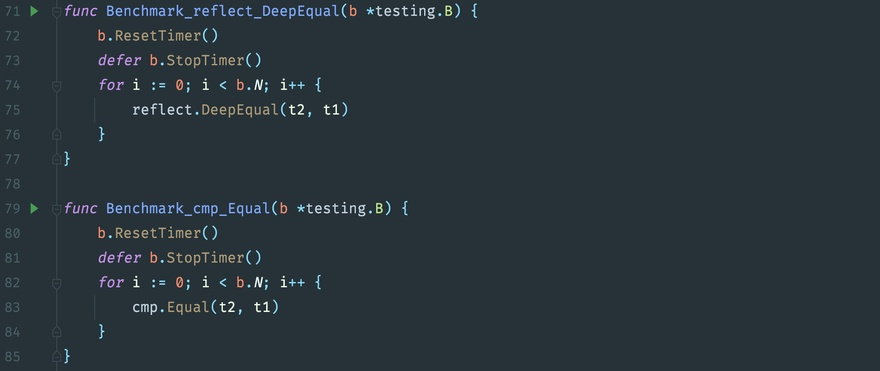You can use reflect.DeepEqual and cmp.Equal to compare two structs of the same type to see if they are equal, or you can use hard-coded comparisons, see below how they perform.

Define a struct with multiple data types, e.g.
1
2
3
4
5
6
|
type T struct {
X int
Y string
Z []int
M map[string]string
}
|
reflect.DeepEqual
This is a built-in function
1
|
reflect.DeepEqual(t2, t1)
|
cmp.Equal
Import library github.com/google/go-cmp/cmp
Hard-coded comparisons
For a particular kind of struct comparison
1
2
3
4
5
6
7
8
9
10
11
12
13
14
15
16
17
18
19
20
21
22
23
24
25
26
27
|
func customEqual(t1, t2 T) bool {
if t1.X != t2.X {
return false
}
if t1.Y != t2.Y {
return false
}
if len(t1.Z) != len(t2.Z) {
return false
}
for i, v := range t1.Z {
if t2.Z[i] != v {
return false
}
}
if len(t1.M) != len(t2.M) {
return false
}
for k := range t1.M {
if t2.M[k] != t1.M[k] {
return false
}
}
return true
}
|
Test Results
1
2
3
4
5
6
7
8
9
10
|
goos: darwin
goarch: amd64
cpu: Intel(R) Core(TM) i7-4870HQ CPU @ 2.50GHz
Benchmark_reflect_DeepEqual
Benchmark_reflect_DeepEqual-8 688875 1595 ns/op 483 B/op 18 allocs/op
Benchmark_cmp_Equal
Benchmark_cmp_Equal-8 139269 8421 ns/op 2840 B/op 52 allocs/op
Benchmark_custom_Equal
Benchmark_custom_Equal-8 10542481 111.9 ns/op 0 B/op 0 allocs/op
PASS
|
In terms of implementation time, it takes more time.
1
|
cmp.Equal > reflect.DeepEqual * 5 > customEqual * 75
|
If the program only compares fixed structs for equality, consider writing your own comparison function for performance.
